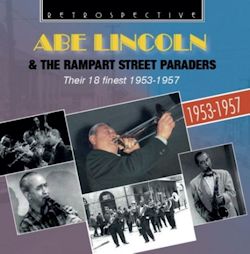From “Jam Session Coast To Coast”
-
South Rampart Street Parade
-
I Ain’t Gonna Give Nobody None O’ This Jelly-Roll
-
Black and Blue
-
The Sheik Of Araby
From “Rampart And Vine”
-
Paducah Parade
-
Sugar
-
Hindustan
-
When I Grow Too Old To Dream
-
A Ghost Of A Chance
From “Dixieland, My Dixieland”
-
Oh, Baby!
-
I’m Gonna Sit Right Down And Write Myself A Letter
-
After You’re Gone
-
When It’s Sleepy Time Down South
From“Texas! (U.S.A.)”
-
March Of The Mustangs
-
Peruna
-
Dallas Blues
As “Matty Matlock & His Dixie Men”
From “Dixieland!”
-
Ida, Sweet As Apple Cider
-
Shim-Me-Sha-Wabble
Abram “Abe” Lincoln (1907-2000) was born in Lancaster, Pennsylvania into a musical family, learning to play cornet at the tender age of 5. He later
switched to the trombone and joined the California Ramblers band in 1926. In 1934 he joined Ozzie Nelson’s band and performed with them until 1939,
when he left and settled down in Los Angeles to a long career as a studio musician in the radio and film industry. Abe became well-known for his
dynamic, exuberant trombone playing and was widely considered to be one of the top jazz trombone players of his era. This CD showcases his talents,
Dixieland-style, with the Rampart Street Paraders.
In 1953, Columbia Records decided to create a 12” LP with a Dixieland jazz theme featuring two different bands, one from each coast. The West Coast
band was a group of studio musicians recruited by Matty Matlock, former clarinet player with Bob Crosby’s Bobcats. Along with Abe Lincoln on
trombone, Matty hired Eddie Miller, another former Bobcat, on tenor saxophone; Stan Wrightsman on piano, notable for his film and sound-track work;
swing jazz guitarist George Van Eps; Phil “The Chief” Stephens, formerly with Tommy Dorsey’s band and another fine studio musician; prolific jazz
drummer Nick Fatool; Clyde Hurley and Johnny Best on trumpet, who played with the Glenn Miller, Tommy Dorsey and Artie Shaw bands, among others;
bass saxophonist Joe Rushton, who played with Benny Goodman’s band; Dixieland trumpet player Dick Cathcart, another studio musician and member of
Lawerence Welk’s band; and well-know rhythm guitarist Al Hendrickson. The group became known as the Rampart Street Paraders, and recorded on 5
albums between 1953 and 1957. They recorded the first four tunes on this CD for the Columbia LP titled ”Jam Session Coast To Coast”. The Sheik Of Araby highlights Abe’s trombone solos, as well as Nick Fatool on drums. In 1955 the Rampart Street Paraders recorded
their own album titled “Rampart and Vine”, named for Rampart Street in New Orleans and Vine Street in Hollywood. This album contributed selections
5 through 9 on this CD. A nice relaxed version of Sugar features Eddie Miller on tenor sax and the wonderful guitar work of George Van
Eps. Abe Lincoln does some amazingly wild sound effects with his trombone on Hindustan. After the solos, they finish with jungle calls and
the announcement that “The cobra is back in the basket”. In 1956 the group released the album titled “Dixieland, My Dixieland”. From this album
comes Oh, Baby!, featuring some nice solos all around, especially by pianist Wrightsman and Matlock on clarinet. In 1957, the Paraders
recorded an interesting album named “Texas (U.S.A.)”, sort of Dixieland, western-style. March of the Mustangs has a distinct Western-swing
rhythm, reminiscent of the Bob Wills band. Peruna is a full-band up-beat version of “She’ll Be Coming Around the Mountain” with some nice
solo trumpet turns by Clyde Hurley and John Best. Later in 1957, the group recorded their last album, “Dixieland”, by the band name Matty Matlock
& His Dixie Men. The classic tune Shim-Me-Sha-Wabble from that album appears on this CD and demonstrates how rich a tight arrangement
can sound.
The Rampart Street Paraders were a talented group of studio musicians that were pulled together for a short recording project, and stayed together
four years to play on five albums. I highly recommend this CD for Dixieland music fans. The music and sound quality are both excellent. A 12-page
booklet is included with helpful and entertaining liner notes by jazz trumpeter and historian Digby Fairweather.
Bruce McCollum
